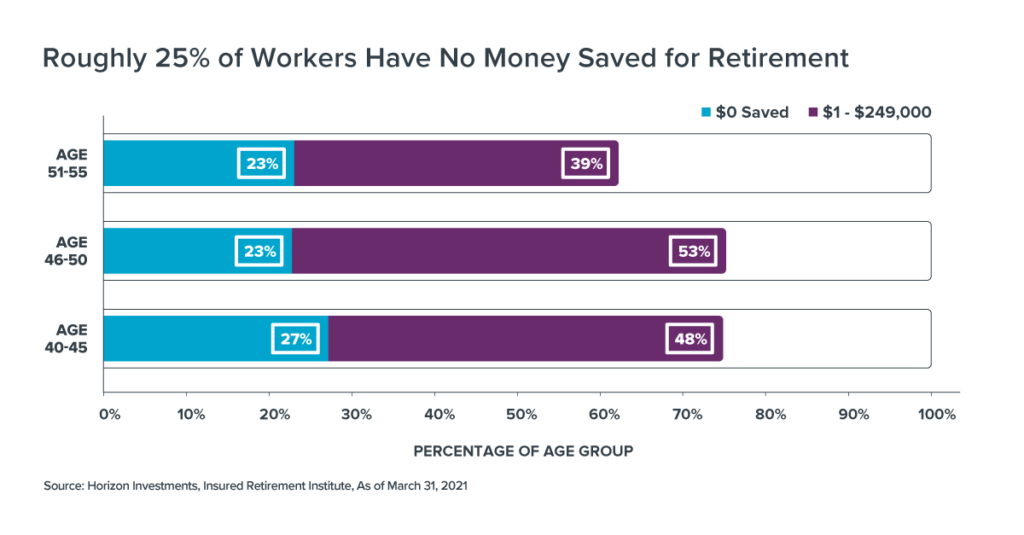About two-thirds of Millennials and Gen Xers would talk to a financial professional about how to use other income streams to delay filing for Social Security benefits until full retirement age.
American workers just got another jolt of bad news about the financial health of Social Security. A recent report moved up the program’s insolvency date – when it would have to cut benefit payments – to 2034.1
That’s just 13 years away. It could be a cold splash of reality for mid- to late-career workers who were assuming Social Security would be their main source of retirement income. They may now be more open to professional advice, according to a Nationwide Retirement Institute survey.2
71% of Millennials (aged 25-40) and 70% of Gen Xers (aged 41-56) responded that they’re interested in talking to a financial professional about how to use different income streams with the aim of putting off taking benefits until their full retirement age, when payouts are higher. A separate survey from the Insured Retirement Institute suggests many workers aged 40 to 55 might want to seek professional help, as about 25% of them have nothing saved for retirement.
A separate survey from the Insured Retirement Institute suggests many workers aged 40 to 55 might want to seek professional help, as about 25% of them have nothing saved for retirement.
What looks like a dire problem – a nest egg that’s too small, the possibility of reduced Social Security benefits, and retirement investing options that become more conservative over time – doesn’t have to become a desperate situation.
Our answer in this situation is to use goals-based financial planning and investing.
In a goals-based framework, the primary retirement risk is longevity – or outliving one’s money – a risk that likely hits close to home for people with limited savings. That existential concern is likely more important to people nearing retirement than the traditional view that focuses on reducing portfolio volatility as someone gets older.
Reorienting to longevity, then, causes a fundamental change in the objective of the retirement plan for people with limited savings: determine how to produce sufficient investment returns to sustain a nest egg for as long as possible, while also supporting a payout ratio that takes the threat of reduced benefits into consideration.
(Read Horizon’s Redefining Risk paper to understand our goals-based investing philosophy)
Horizon Investments’ Real Spend retirement income strategy may be helpful as it was designed specifically with the aim of reducing longevity risk. It carries a greater exposure to equities than what is typically found in traditional financial advice or target date funds with the aim of producing stable or growing assets over time.
The Real Spend equity allocation decisions, coupled with tactical risk mitigation and an intelligent rebalance design, are designed with the goal of limiting a retiree’s investing risk in meeting their pressing short- and long-term financial needs.
See our Real Spend strategy and download our distribution stage brochure for further details about how advisors can help their clients tackle common retirement income challenges, including Social Security.
To download a copy of this commentary, click the button below.
Further reading:
Does It Make Sense to Invest in Stocks When They’re at Record Highs?
Corporate America’s Profit Machine Is as Strong as Ever
Over 65 Years Old and Working? That’s Not as Common Anymore
Are Glide Path Strategies Still a Good Option for Retirement?
Junk-Bond Yields Don’t Provide Much of a Cushion Against Inflation
Essentially Nothing. That’s How Much Bonds May Return Over Next Five Years
1 NPR.com, “COVID Recession Pushed Social Security Insolvency Up a Year’’
2 Nationwide Retirement Institute, https://nationwidefinancial.com/media/pdf/NFM-20936AO.pdf
Nothing contained herein should be construed as an offer to sell or the solicitation of an offer to buy any security. This report does not attempt to examine all the facts and circumstances that may be relevant to any company, industry or security mentioned herein. We are not soliciting any action based on this document. It is for the general information of clients of Horizon Investments, LLC (“Horizon”). This document does not constitute a personal recommendation or take into account the particular investment objectives, financial situations, or needs of individual clients. Before acting on any analysis, advice or recommendation in this document, clients should consider whether the security in question is suitable for their particular circumstances and, if necessary, seek professional advice. Investors may realize losses on any investments. Index information is intended to be indicative of broad market conditions. The performance of an unmanaged index is not indicative of the performance of any particular investment. It is not possible to invest directly in an index.
Past performance is not a guide to future performance. Future returns are not guaranteed, and a loss of original capital may occur. This commentary is based on public information that we consider reliable, but we do not represent that it is accurate or complete, and it should not be relied on as such. Opinions expressed herein are our opinions as of the date of this document. These opinions may not be reflected in all of our strategies. We do not intend to and will not endeavor to update the information discussed in this document. No part of this document may be (i) copied, photocopied, or duplicated in any form by any means or (ii) redistributed without Horizon’s prior written consent.
The Real Spend® retirement income strategy is NOT A GUARANTEE against market loss and there is no guarantee that the Real Spend® strategy chosen by an investor will lead to successful investment outcomes for part of, or for the entirety of an investor’s retirement. This strategy is not an insurance product with payments guaranteed. It is a strategy that invests in marketable securities, any of which will fluctuate in value. Before investing, consider the investment objectives, risks, charges, and expenses of the strategy. Keep in mind investing involves risk. The value of an investment will fluctuate over time and will gain or lose money.
Other disclosure information is available at hinubrand.wpengine.com.
Horizon Investments and the Horizon H are registered trademarks of Horizon Investments, LLC
©2021 Horizon Investments LLC

